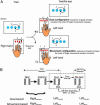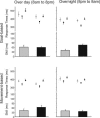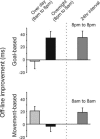Off-line learning of motor skill memory: a double dissociation of goal and movement
- PMID: 16330773
- PMCID: PMC1312380
- DOI: 10.1073/pnas.0506072102
Off-line learning of motor skill memory: a double dissociation of goal and movement
Abstract
Acquiring a new skill requires learning multiple aspects of a task simultaneously. For example, learning a piano sonata requires learning the musical notes and being able to implement this goal by learning the appropriate sequence of finger movements. After practice, skill continues to develop off-line during a period of consolidation. Here we show that different aspects of a procedural memory are processed separately during consolidation: Only the movement sequence is enhanced over the day; whereas only the goal is enhanced over a night of sleep. This double dissociation suggests that distinct systems, enhancing different aspects of a procedural memory, support improvements during consolidation. Consolidation is not a single process; instead, there are multiple routes to off-line learning, and the engagement of these distinct mechanisms is determined by when consolidation takes place.
Figures



References
-
- Brooks, V. B. (1986) The Neural Basis of Motor Control (Oxford Univ. Press, New York).
-
- Willingham, D. (1999) Mem. Cognit. 27, 561-572. - PubMed
-
- Willingham, D., Wells, L., Farrell, J. & Stemwedel, M. (2000) Mem. Cognit. 28, 366-375. - PubMed
-
- Japikse, K., Negash, S., Howard, J. & Howard, D. (2003) Exp. Brain Res. 148, 38-49. - PubMed
-
- Hikosaka, O., Nakamura, K., Sakai, K. & Nakahara, H. (2002) Curr. Opin. Neurobiol. 12, 217-222. - PubMed
Publication types
MeSH terms
Grants and funding
LinkOut - more resources
Full Text Sources
Other Literature Sources
Medical

